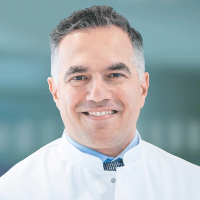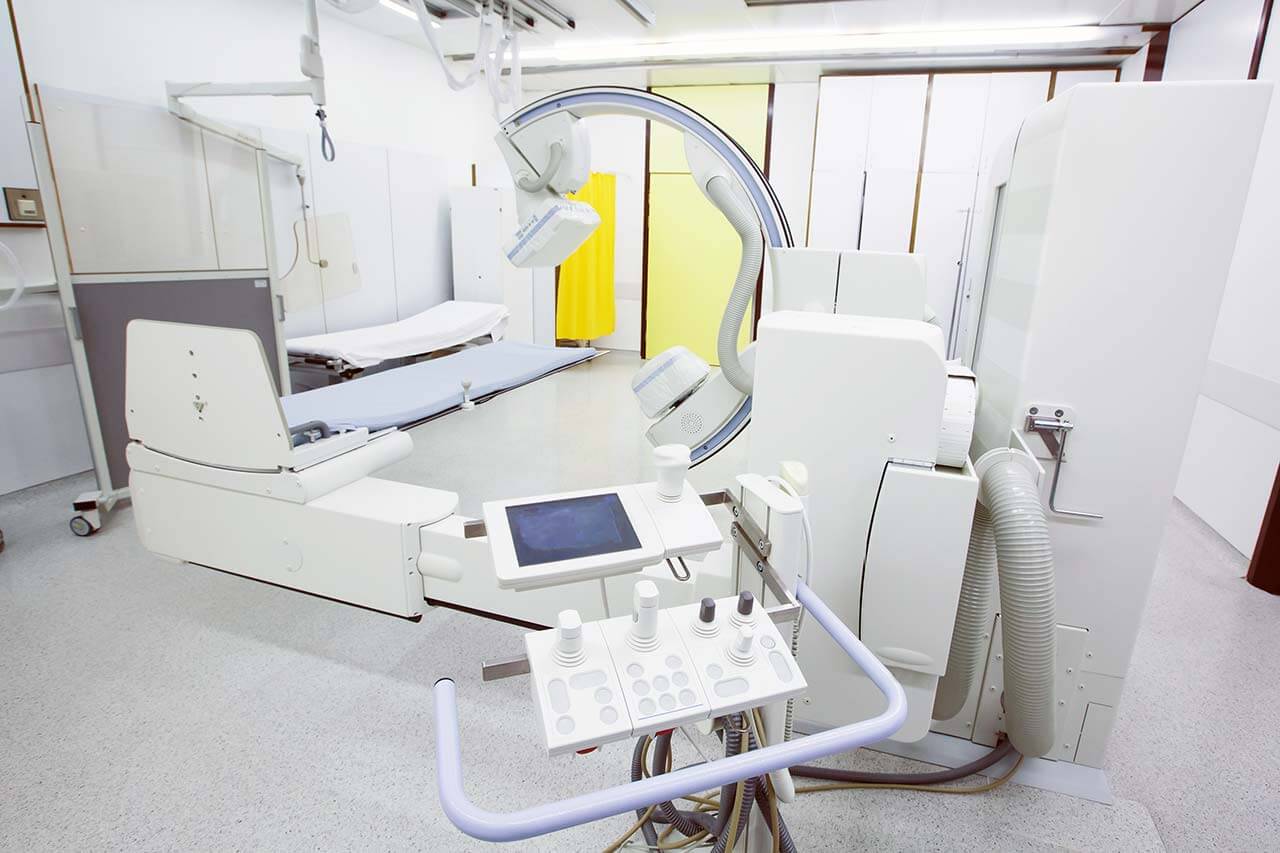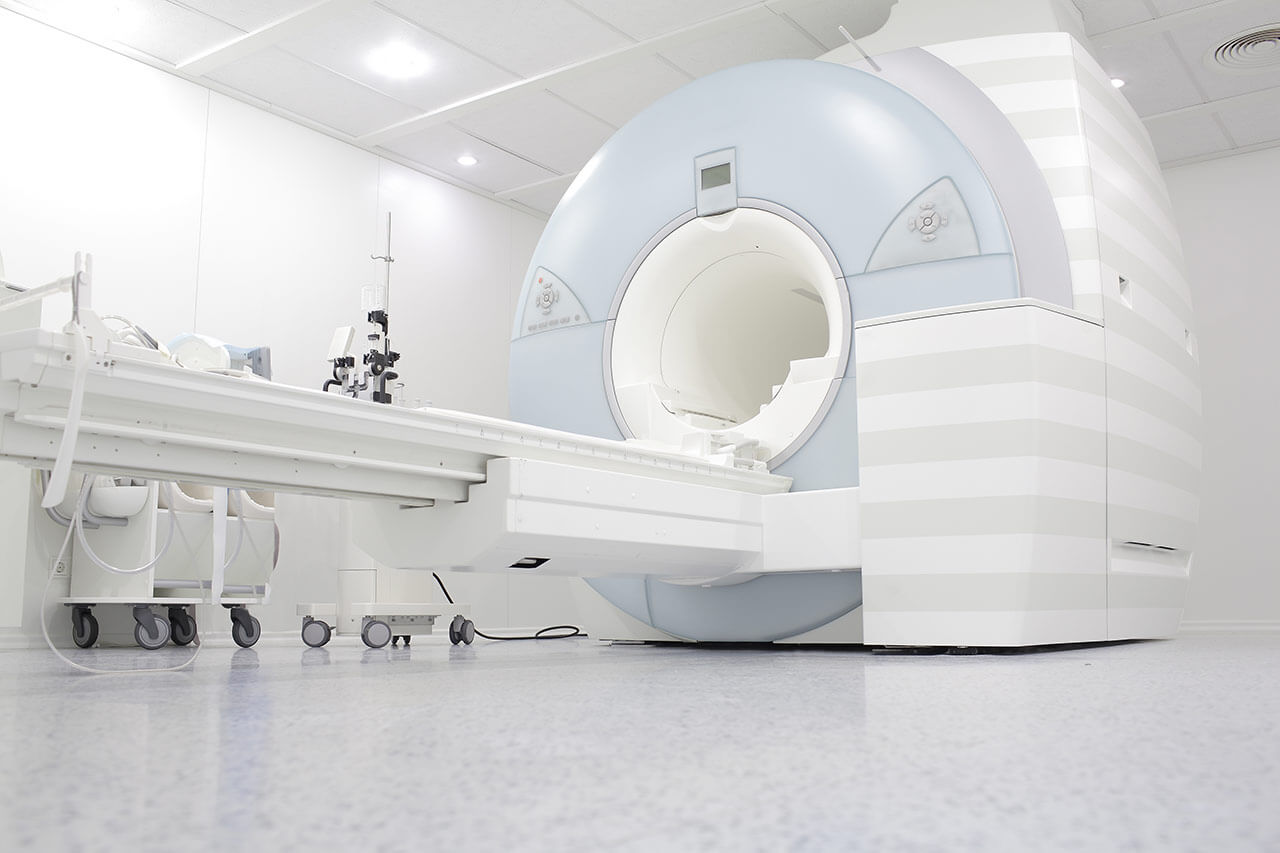
The program includes:
- Initial presentation in the clinic
- clinical history taking
- physical examination
- cardiological examination
- laboratory tests:
- complete blood count
- biochemical analysis of blood
- TSH-basal, fT3, fT4
- inflammation indicators
- indicators blood coagulation
- measurement of arterial blood pressure
- electrocardiogram
- holter monitoring (24h)
- echocardiography or transesophageal echocardiography
- preoperative care
- cardiac catheterization
- resection and end-to-end anastomosis of aortic coartation
- symptomatic treatment
- control examinations
- the cost of essential medicines and materials
- nursing services
- full hospital accommodation
- explanation of future recommendations
Required documents
- Medical records
- Echocardiography (if available)
Service
You may also book:
 BookingHealth Price from:
BookingHealth Price from:
About the department
The Department of Adult and Pediatric Cardiothoracic Surgery, Vascular Surgery, Heart and Lung Transplantation at the Hannover Medical School offers the full range of services in these medical fields and ranks among the world's leading medical centers. It provides the effective surgical treatment of diseases of the heart, heart valves, congenital heart defects, pathologies of blood vessels and thoracic organs. The department specializes in the implantation of pacemakers, defibrillators, and mechanical circulatory support systems. In addition, the department is a renowned center for heart and lung transplantation, as well as combined heart-lung transplantation. The team of the department's surgeons annually performs about 2,000 operations using a heart-lung machine. The medical facility also performs more than 250 heart surgeries for children, about 120 lung transplantations and 30 heart transplantations every year. It is not surprising that performing so many complex operations, the department ranks among the best European Heart Surgery Centers. The department is headed by Prof. Dr. med. Arjang Ruhparwar.
The key to excellent treatment results, which the department has been showing over the years, is not only the high competence of doctors, state-of-the-art equipment and advanced surgical methods, but also active research activities. The medical facility ranks among the leading research centers in Europe, which carries out continuous work to improve the existing treatment methods in the field of cardiothoracic, vascular and transplant surgery, as well as develops and implements innovative therapeutic techniques.
Of particular interest in the field of cardiac surgery is the surgical treatment of heart valve diseases, coronary artery pathologies, as well as operations for the implantation of ventricular assist devices. Whenever possible, cardiac surgery is performed using minimally invasive surgical techniques, without thoracotomy. This innovative approach to treatment allows the patient to recover from surgery in the shortest possible time and avoid serious risks related to classical open surgery.
The department's pediatric cardiac surgeons deal with the treatment of congenital heart defects in children of all age groups. The department has more than 40 years of experience in this field, so surgeons have the necessary clinical skills to provide high-quality medical care to young patients with any cardiac diseases – from atrial septal defect to ventricular hypoplasia. The department also supervises adult patients with congenital heart defects.
The department's thoracic surgeons in collaboration with pulmonologists provide the surgical treatment of all benign and malignant diseases of the lungs, bronchi and trachea, thoracic wall and diaphragm. If lung cancer is diagnosed in a patient, the specialists from related medical disciplines are involved in the therapeutic process, who cooperatively develop the most effective and sparing treatment regimen. The specialists also have vast experience in surgery for thoracic wall deformities. The most common intervention in this area is the minimally invasive Nuss procedure to correct pectus excavatum. The operation has been performed in the department since 2014.
The department's doctors achieve excellent results in vascular surgery. Therapeutic options include both classic open surgery and modern endovascular interventions. The department regularly performs surgeries to treat carotid artery stenoses and occlusions, aortic reconstruction surgeries, bypass grafting, as well as decompression surgery for thoracic outlet syndrome. Vascular surgeons can be proud of their excellent results in the treatment of varicose veins and chronic venous insufficiency. The service range in the field of vascular surgery is complemented by percutaneous transluminal angioplasty, lysis therapy, implantation of port systems, and the formation of dialysis access.
An equally important area of the department's specialization is heart, lung, and heart-lung transplantation. The transplantation program in the department started back in 1983. Since then, the number of heart and lung transplantations, as well as simultaneous heart and lung transplantations has grown steadily. Today, the department is a leader in transplantation medicine in Europe. The survival rates of patients after lung transplantation reach 87% after 1 year and almost 50% after 10 years – the best results in the world. Both the pediatric lung transplantation program (more than 10 transplants per year) and the lung donation program introduced in 2012 are unique in Germany.
The department's range of medical services includes:
- Surgical treatment of heart valve pathologies
- Surgery to replace and repair heart valves (especially mitral valve reconstruction and aortic valve reconstruction using the David procedure)
- Implantation of a seamless heart valve
- Implantation of a "growing" heart valve in children (tissue engineering)
- Repeated prosthetic repair of the heart valve
- Minimally invasive mitral valve surgery
- Repeated interventions after previous cardiac surgery
- Interventional aortic valve replacement (transapical / aortic access)
- Coronary surgery
- Minimally invasive techniques, including revascularization on beating heart (for example, without the use of a heart-lung machine)
- Total arterial coronary revascularization, the use of arterial grafts from the internal thoracic artery and radial artery
- Coronary artery bypass grafting for acute myocardial infarction
- Reconstruction for severe coronary artery lesions
- Treatment of secondary complications caused by ischemic heart disease (ventricular aneurysm, ventricular septal defect, heart failure)
- Coronary surgery using modern perfusion systems (miniaturized heart-lung machine)
- Aortic surgery
- All types of replacement and reconstruction of the aortic root, for example, Ross procedure and David procedure
- Ascending aortic dissection
- Treatment of thoracic, thoracoabdominal and abdominal aortic aneurysms using a heart lung-machine
- Implantation of homografts (the patient's own blood vessels)
- Organ transplantation
- Lung transplantation
- Heart transplantation
- Heart-lung transplantation
- Implantation of mechanical circulatory support systems
- Vascular surgery
- Reconstructive interventions on the arteries, for example, for carotid thromboembolism
- Operations on supra-aortic vessels
- Aortic replacement surgery
- Reconstruction of pelvic and thigh veins (Y-prosthesis)
- Renal artery bypass and visceral artery bypass grafting
- Decompression procedures, for example, for thoracic outlet syndrome
- Complex interventions for replacement of the vena cava in case of cancer
- Vascular surgery in children
- Treatment of infected vascular prostheses using cryopreserved human allografts (homografts) and surgery for relapses
- Use of an extracorporeal perfusion method to protect organs, for example, in supra- and perirenal aortic aneurysms
- Percutaneous transluminal coronary angioplasty (PTCA), implantation of peripheral and central stents (including stent implantation in the carotid artery, iliac artery recanalization)
- Endovascular aortic stenting
- Implantation of dialysis shunts
- Implantation of permanent catheters
- Thoracic surgery
- Resection of benign and malignant tumors of the thoracic organs, lungs and respiratory tract (bronchi, trachea)
- Diagnostic interventions for the detection of lung diseases (mediastinoscopy, video-аssisted thoracoscopy)
- Thymectomy (removal of thymus) in myasthenia gravis
- Correction of thoracic deformities, such as pectus excavatum and pectus carinatum
- Treatment of injuries of the thoracic organs and sternum (rib fractures, sternal instability)
- Surgery for thoracic outlet syndrome (1st rib or cervical rib resection)
- Sympathectomy for hyperhidrosis (increased sweating in the head, arms and hands)
- Palliative care for patients with severe lung diseases
- Surgical treatment of congenital heart defects
- Surgical correction of congenital heart defects in infants
- Treatment of the hypoplastic left or right heart syndrome
- Heart valve reconstructive surgery and aortic arch surgery
- Late correction and treatment of recurrent, residual and accompanying defects in adults with congenital heart defects
- Implantation of tissue-engineered heart valves
- Implantation of pacemakers
- Procedures to replace organ functions in cardiac and pulmonary failure (ECMO), artificial heart implantation
- Heart, lung transplantation and simultaneous heart and lung transplantation
- Other treatment methods
Curriculum vitae
Higher Education
- 10.1987 - 05.1994 Medical studies, University of Cologne.
- 05.1994 Third state exam and admission to medical practice.
- Internships abroad: University of South Alabama and Baylor College of Medicine, USA.
Medical Practice and Research Activities
- 01.06.1994 - 31.07.1994 Internship, Department of Cardiac Surgery, University Hospital Cologne.
- 01.08.1994 - 30.11.1995 Internship, Department of Adult and Pediatric Cardiothoracic Surgery, Vascular Surgery, Heart and Lung Transplantation, Hannover Medical School.
- 01.12.1995 - 31.10.2001 Research Associate, Department of Adult and Pediatric Cardiothoracic Surgery, Vascular Surgery, Heart and Lung Transplantation, Hannover Medical School.
- 03.1997 - 03.1999 Research Fellowship, Krannert Cardiovascular Research Center, Indiana University, USA.
- 01.11.2001 - 30.12.2004 Acting Head, Department of Adult and Pediatric Cardiothoracic Surgery, Vascular Surgery, Heart and Lung Transplantation, Hannover Medical School.
- 27.05.2004 Board certification in Cardiac Surgery.
- 01.2005 - 09.2006 Senior Physician, Department of Adult and Pediatric Cardiothoracic Surgery, Vascular Surgery, Heart and Lung Transplantation, Hannover Medical School.
- 11.2001 - 09.2006 Senior Physician, Intensive Care Unit, Department of Adult and Pediatric Cardiothoracic Surgery, Vascular Surgery, Heart and Lung Transplantation, Hannover Medical School.
- Since 10.2006 Senior Physician, Department of Cardiac Surgery, University Hospital Heidelberg.
- Since 02.2009 Preparation for a research position in the field of surgery and permission to conduct and manage clinical trials, Coordination Centre for Clinical Trials, Heidelberg.
- 03.2009 Venia legendi, Hannover Medical School.
- Since 12.2009 Head of the Section for Heart Transplantation and Mechanical Circulatory Support.
- 10.2011 Habilitation, Ruprecht Karl University of Heidelberg.
- 12.2012 Extraordinary Professorship of Cardiac Surgery.
- 2015 Deputy Head, Department of Cardiac Surgery, University Hospital Heidelberg.
- Since 04.2023 Head Physician, Department of Adult and Pediatric Cardiothoracic Surgery, Vascular Surgery, Heart and Lung Transplantation, Hannover Medical School.
Awards and Honors
- 2001 Outstanding Research Award in Pediatric Cardiology, American Heart Association (AHA).
- 2004 - 2005 Award from Braukmann Wittenberg Foundation to support the research project.
- 2005 Late Breaking Basic Science, American Heart Association (AHA).
- 2007 Vivien Thomas Young Investigator Award, American Heart Association (AHA).
- 2012 Young Investigator Award, North American Society of Cardiovascular Imaging (NASCI).
- 2014 Best Article Award from the European Congress of Organ Donation, European Society for Organ Transplantation.
- 2014 Young Investigator Award, American Heart Association (AHA).
Photo of the doctor: (c) Medizinische Hochschule Hannover (MHH)
About hospital
The Hannover Medical School has the status of a leading German medical facility. The advanced medical technologies, highly qualified specialists, as well as productive research activities form a solid basis for top-class medical service of the world standard. The hospital is proud of its outstanding achievements in the treatment of cancer, diseases of the lung, heart, kidney, liver and metabolic disorders, as well as surgical diseases.
The medical facility diagnoses and treats more than 63,000 inpatients and about 470,000 outpatients annally. These indicators are growing steadily, which indicates the reputability and prestige of the hospital in the European medical arena.
For decades, the hospital has been a pioneer in transplantation medicine and is one of the leading centers of this specialization in the world. It performs about 400 transplantations of solid organs annually. Also, the hospital has performed over 130 bone marrow transplantations. In addition, the hospital ranks among the world leaders in cochlear implantation for the treatment of hearing loss.
Much attention is paid to interdisciplinary cooperation. Since 2016, the hospital has the largest certified Cancer Center in the Federal State of Lower Saxony, which provides comprehensive, multidisciplinary medical care in accordance with the standardized protocols of cancer societies.
The specialists of the hospital offer patients not only modern treatment of the highest quality, but also attentive care, sympathetic attitude to the patient's problems and understanding of his individual needs. Thus, the patient can be sure that his health is in the safe hands of highly qualified doctors.
Photo: (c) depositphotos
Accommodation in hospital
Patients rooms
The patients of the Hannover Medical School live in comfortable and cozy rooms. Each patent room has an ensuite bathroom with shower and toilet. A standard patient room includes an automatically adjustable bed with an orthopedic mattress, a bedside table, a wardrobe, a TV and a telephone. You can use TV, telephone and Internet using a special chip card, which can be purchased at self-service terminals or ordered at the service counter. The hospital allows the patients to use mobile phones, with the exception of intensive care units, some departments and diagnostic rooms.
If desired, the patient can stay in an enhanced-comfort room. Such rooms are distinguished by a more sophisticated design, and are additionally equipped with upholstered furniture, a safe for storing valuables and a mini fridge.
Meals and Menus
The patient and the accompanying person are offered delicious and balanced three meals a day. Breakfast and dinner are served buffet style and lunch can be chosen from three set menus. All dishes are prepared by professional chefs using the freshest ingredients available in the region.
If you are on a specific diet for some reason, you will be offered an individual menu. Please inform the medical staff about your dietary preferences prior to the treatment.
Further details
Standard rooms include:
Religion
There is a chapel on the territory of the hospital, where Christian and Catholic services are regularly held. The hospital provides a prayer room for followers of Islam, which is open for visits 24 hours a day.
Religious services can also be provided upon request.
Accompanying person
During an inpatient program, an accompanying person can stay with you in the patient room or in a hotel of your choice.
Hotel
During an outpatient program, you can stay in a hotel of your choice. The managers will help you choose the most suitable options.




